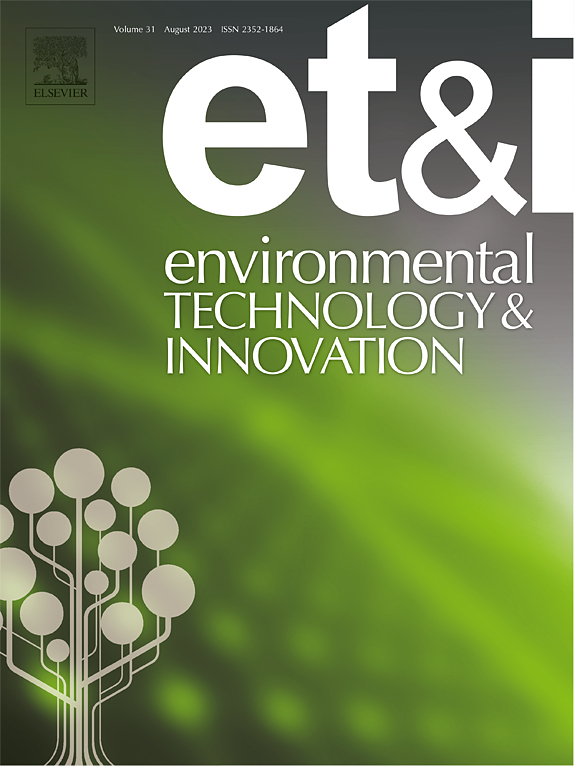Unlocking cold biomass valorization: Aspartate-mediated upregulation of cellulolytic pathways enhances fungal cold adaptation and straw decomposition
IF 7.1
2区 环境科学与生态学
Q1 BIOTECHNOLOGY & APPLIED MICROBIOLOGY
引用次数: 0
Abstract
Straw fertilization is essential for sustainable agriculture; however, low temperatures in regions like Northeast China hinder straw degradation, leading to residue accumulation. Psychrophilic fungi, predominant in cold environments, are crucial for decomposition under such conditions. In this study, we isolated and characterized two psychrophilic strains, Pseudogymnoascus sp. YL55 and Aspergillus terreus S21, and characterized a cold sensitive and impaired in cellulase mutant named M427 from a T–DNA insertion library of YL55. Molecular analysis indicated that the disrupted gene encodes aspartate aminotransferase (AST). Targeted deletion of the ast gene in both YL55 and S21 led to slow growth of colony and downregulation of lignocellulolytic genes, overexpression Past (OEPast) capable of producing more endonucular and exonucone cellulase. Exogenous aspartate supplementation restored cellulase gene expression and growth defect in ∆Past, and enhanced the expression of cellulase gene and colony growth in mesophilic A. terreus CK48 under cold conditions. Composting trials showed that OEPast + CK48 can promote the rapid start–up of low temperature composting, more reducing sugars and humus were released, which could promote plants growth. Overall, this study shed a novel link between aspartate metabolism, cellulase expression, and cold tolerance, offering potential for engineering robust, cellulose degrading fungi to improve low temperature biomass composting, providing a new biotechnological strategy for other fungi to efficiently decompose straw in winter.
解锁冷生物量增值:天冬氨酸介导的纤维素水解途径上调增强了真菌的冷适应和秸秆分解
秸秆施肥对可持续农业至关重要;然而,东北等地区的低温阻碍了秸秆的降解,导致秸秆残留积累。在寒冷环境中占优势的嗜冷真菌对这种条件下的分解至关重要。本研究从拟裸子曲霉(Pseudogymnoascus sp. YL55)和土曲霉(Aspergillus terreus S21)两株嗜冷菌株中分离鉴定,并从其T-DNA插入文库中鉴定出一株对冷敏感的纤维素酶突变体M427。分子分析表明,该基因编码天冬氨酸转氨酶(AST)。在YL55和S21中靶向缺失ast基因导致菌落生长缓慢和木质纤维素降解基因下调,过表达Past (OEPast)能够产生更多的核内和外核胞内纤维素酶。在低温条件下,外源天冬氨酸的补充恢复了中温嗜菌A. terreus CK48中纤维素酶基因的表达和生长缺陷,并增强了纤维素酶基因的表达和菌落生长。堆肥试验表明,OEPast + CK48能促进低温堆肥快速启动,释放出更多的还原糖和腐殖质,促进植物生长。总的来说,本研究揭示了天冬氨酸代谢、纤维素酶表达和耐寒性之间的新联系,为工程上强大的纤维素降解真菌改善低温生物质堆肥提供了潜力,为其他真菌在冬季有效分解秸秆提供了新的生物技术策略。
本文章由计算机程序翻译,如有差异,请以英文原文为准。
求助全文
约1分钟内获得全文
求助全文
来源期刊

Environmental Technology & Innovation
Environmental Science-General Environmental Science
CiteScore
14.00
自引率
4.20%
发文量
435
审稿时长
74 days
期刊介绍:
Environmental Technology & Innovation adopts a challenge-oriented approach to solutions by integrating natural sciences to promote a sustainable future. The journal aims to foster the creation and development of innovative products, technologies, and ideas that enhance the environment, with impacts across soil, air, water, and food in rural and urban areas.
As a platform for disseminating scientific evidence for environmental protection and sustainable development, the journal emphasizes fundamental science, methodologies, tools, techniques, and policy considerations. It emphasizes the importance of science and technology in environmental benefits, including smarter, cleaner technologies for environmental protection, more efficient resource processing methods, and the evidence supporting their effectiveness.
 求助内容:
求助内容: 应助结果提醒方式:
应助结果提醒方式:


